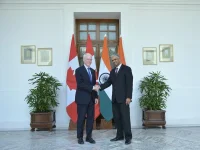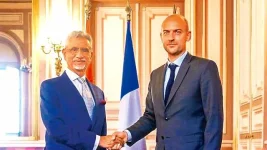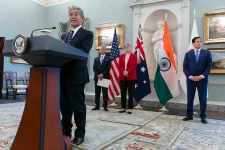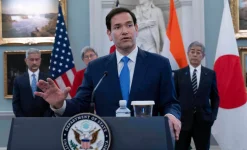Union Minister of Ports, Shipping, and Waterways Sarbananda Sonowal on Wednesday held bilateral meetings with his counterparts from Norway on strengthening bilateral cooperation between India and the Scandinavian country in green maritime technologies such as the electrification of ferry systems.
The Minister held meetings with Norway’s Transport Minister Jon-Ivar Nygard as well as with Minister of Fisheries and Ocean Policy, Marianne Sivertsen, on the sidelines of the Nor-Shipping event being held here.
Sonowal’s meeting with Nygard focused on ways to enhance the application of ‘Green Maritime Technologies’. Both countries also agreed to deepen cooperation and exchange experiences on ferry system electrification, drawing inspiration from Norway’s successful implementation of the initiative.
In his remarks on the occasion, Sonowal said: “India is advancing port infrastructure, green shipping, shipbuilding, and digitalisation under Prime Minister Narendra Modi’s ‘Maritime India Vision 2030’. India is on a bold mission to transform its ports into global investment hubs, leveraging public-private partnerships (PPP) and green energy integration.”
Building on the Green Coastal Shipping Programme and Green Voyage 2050, India and Norway discussed deeper collaboration in green maritime technologies. Both sides explored joint efforts in smart logistics, digital port ecosystems, and clean coastal shipping. India’s MAITRI initiative and Norway’s expertise in AI-driven port management, digital twins, and alternative fuels like LNG, hydrogen, and electric propulsion offer strong synergies to advance a sustainable Blue Economy.
Highlighting the India-Norway initiative in this regard, Sonowal added: “We are also working in a big way on Green Shipping, Green Tug Transition, e-Methanol Bunkering, and hydrogen-powered vessels. India and Norway can continue this partnership and manufacture electric ferries and vessels for the emerging global demand in this sector.”
“India is keen to partner with Norway for best practices in the electrification of the ferry system to optimise our rich and vast inland waterways. This will further our common goal of a decarbonised and efficient transport system for the smooth passage of cargo and passengers,” he added.
In his meeting with Norway’s Minister of Fisheries and Ocean Policy, Sivertsen, the Indian minister discussed possibilities and opportunities in ship recycling, seafarers’ training, sustainable fisheries and ocean management, ocean renewable energy, and offshore hydrocarbons.
Both sides agreed to leverage Norway’s cutting-edge ship design expertise and India’s robust shipyard capacity to jointly produce world-class, eco-friendly vessels, driving a transformative shift in sustainable maritime transport.
Discussions on the ship recycling sector focused on leveraging expertise and green technologies to promote sustainable ship-breaking practices, with an emphasis on improving environmental, health, and safety standards. The role of the Alang Ship Recycling Yard in Gujarat was highlighted as a potential site for such interventions.
Sonowal called for Norway’s support in building human capital by imparting seafarer training, especially in polar waters, cybersecurity, and advanced maritime skills.
Emphasising the vast potential of the Blue Economy, he invited Norwegian firms to explore joint ventures in ocean renewable energy, particularly wind and tidal power, sustainable aquaculture, and deep-sea exploration, aligning with environmental goals and India’s growing maritime ambitions.
The Indian team also proposed to conduct a joint feasibility study for operationalising the Northern Sea Route (NSR) with Norwegian and Indian agencies. India expressed its keenness to work with Norway in Arctic navigation by collaborating on R&D in Arctic shipping, design and construction of ice-class vessels, and advancement of navigational technologies.





